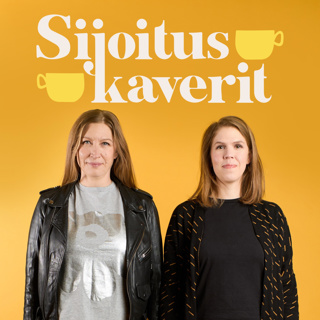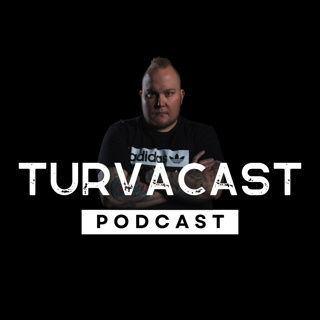
The peril (and promise) of AI with Tristan Harris: Part 2
What if you could no longer trust the things you see and hear?Because the signature on a check, the documents or videos presented in court, the footage you see on the news, the calls you receive from your family … They could all be perfectly forged by artificial intelligence.That’s just one of the risks posed by the rapid development of AI. And that’s why Tristan Harris of the Center for Humane Technology is sounding the alarm.This week on How I Built This Lab: the second of a two-episode series in which Tristan and Guy discuss how we can upgrade the fundamental legal, technical, and philosophical frameworks of our society to meet the challenge of AI.To learn more about the Center for Humane Technology, text “AI” to 55444.This episode was researched and produced by Alex Cheng with music by Ramtin Arablouei.It was edited by John Isabella. Our audio engineer was Neal Rauch.You can follow HIBT on X & Instagram, and email us at hibt@id.wondery.com.See Privacy Policy at https://art19.com/privacy and California Privacy Notice at https://art19.com/privacy#do-not-sell-my-info.
29 Helmi 202432min

Poshmark: Manish Chandra
When the iPhone 4 was released in 2010, Manish Chandra was dazzled by its picture quality, and saw an opportunity for a new type of mobile marketplace. A year later, he and three co-founders launched Poshmark, a shopping app for second-hand clothes and accessories, meant to capture the feel of going thrifting with your friends. The online community grew quickly and vocally—when Poshmark raised shipping fees, users lobbied furiously to lower them, and won. The company faced many more growing pains before being acquired by the Naver Corporation for $1.2 billion in 2023. It now has over 100 million registered users around the world.This episode was produced by Sam Paulson with music composed by Ramtin Arablouei.It was edited by Neva Grant with research help from Katherine Sypher.Our engineers were Robert Rodriguez and Josh Newell.You can follow HIBT on Twitter & Instagram, and email us at hibt@id.wondery.com.See Privacy Policy at https://art19.com/privacy and California Privacy Notice at https://art19.com/privacy#do-not-sell-my-info.
26 Helmi 20241h 6min

The peril (and promise) of AI with Tristan Harris: Part 1
When Tristan Harris co-founded the Center for Humane Technology in 2018, he was trying to educate tech leaders and policymakers about the harms of social media.But today, he’s sounding the alarm about a different technology — one that he says could pose an existential threat to the entire world …Artificial intelligence.This week on How I Built This Lab: the first of a two-episode series in which Tristan and Guy examine the serious risks posed by the rapid development and deployment of AI — and what we can do to make sure this powerful technology is used for good.You can learn more about “The Social Dilemma,” the 2020 Emmy-winning docudrama featuring Tristan, here: https://www.thesocialdilemma.com/.This episode was researched and produced by Alex Cheng with music by Ramtin Arablouei.It was edited by John Isabella. Our audio engineer was Neal Rauch.You can follow HIBT on X & Instagram, and email us at hibt@id.wondery.com.See Privacy Policy at https://art19.com/privacy and California Privacy Notice at https://art19.com/privacy#do-not-sell-my-info.
22 Helmi 202428min

Sonos: John MacFarlane
In 2002, John MacFarlane and his co-founders began tinkering on what was then an ambitious idea: create a new way to enjoy music throughout the home, without wires. At the time, streaming and the iPod were brand new, and smart speakers were over a decade away. But the team at Sonos engineered a top-quality wireless sound system, and–with many fits and starts–integrated it with mobile technology and, eventually, Siri and Alexa. Along the way, John and his team contended with the early unreliability of WiFi, and faced stiff competition from much bigger companies. But today, Sonos is an established player in music, with projected sales of over $1.5 billion this year. This episode was produced by Katherine Sypher with music composed by Ramtin Arablouei.It was edited by Neva Grant with research help from Sam Paulson.You can follow HIBT on Twitter & Instagram, and email us at hibt@id.wondery.com.See Privacy Policy at https://art19.com/privacy and California Privacy Notice at https://art19.com/privacy#do-not-sell-my-info.
19 Helmi 20241h

Powering cars with solar energy with Steve Fambro of Aptera Motors (2023)
There’s a new car coming to market that will probably make its owners search out the sunniest spots in the parking lot… Aptera Motors is designing and manufacturing this car: a plug-in electric hybrid that can run up to 40 miles on a single, solar-powered charge. This week on How I Built This Lab, Steve Fambro shares how he and his co-CEO revived their once-defunct auto company thanks to the promise of solar energy. Plus, Steve’s take on why today’s vehicles require so much energy, and how Aptera’s novel design could change the way we think about cars forever…This episode was produced by Kerry Thompson and edited by John Isabella, with music by Ramtin Arablouei. Our audio engineer was Neal Rauch. You can follow HIBT on Twitter & Instagram, and email us at hibt@id.wondery.com.See Privacy Policy at https://art19.com/privacy and California Privacy Notice at https://art19.com/privacy#do-not-sell-my-info.
15 Helmi 202439min

Magic Spoon & Exo: Gabi Lewis and Greg Sewitz
Gabi Lewis and Greg Sewitz founded Magic Spoon to create a sugary breakfast cereal without the sugar. If that sounds daunting, consider their first business: protein bars made with cricket flour. Riffing on an idea that began as a college assignment, the founders ordered live crickets to roast at home, and worked with a top-rated chef to perfect their recipes. The only problem: getting people to eat a snack made of ground-up bugs. When Exo protein bars eventually stalled, the pair pivoted to another ambitious idea: breakfast cereal that tasted like the Fruit Loops and Cocoa Puffs of childhood–but minus the sugar and grains. Drawing on their roller-coaster experience with Exo, Gabi and Greg revisited winning strategies, and scrapped the plays that didn’t work, eventually building Magic Spoon into a nationwide brand.This episode was produced by J.C. Howard, with music by Ramtin ArabloueiEdited by Neva Grant, with research help from Sam Paulson.You can follow HIBT on Twitter & Instagram, and email us at hibt@id.wondery.com.See Privacy Policy at https://art19.com/privacy and California Privacy Notice at https://art19.com/privacy#do-not-sell-my-info.
12 Helmi 20241h 11min

Building a decarbonization army with Shashank Samala of Heirloom
Cutting emissions alone will not be enough. To avoid the worst effects of global climate change, Heirloom CEO and co-founder Shashank Samala believes we’ll also need to pull a lot of carbon out of the atmosphere...This week on How I Built This Lab, Shashank’s leap into climate entrepreneurship, launching the company that, in just four years, built North America’s first operational carbon capture facility. Plus, Heirloom’s novel approach to carbon removal—one tray of limestone at a time.This episode was produced by Casey Herman with music by Ramtin Arablouei.It was edited by John Isabella with research help from Carla Esteves. Our audio engineer was Neal Rauch.You can follow HIBT on X & Instagram, and email us at hibt@id.wondery.com.See Privacy Policy at https://art19.com/privacy and California Privacy Notice at https://art19.com/privacy#do-not-sell-my-info.
8 Helmi 202427min

Parachute Home: Ariel Kaye
In 2012, Ariel Kaye saw a tantalizing opportunity, but wasn’t sure she was the one to seize it. She’d never started a brand and didn’t think of herself as an entrepreneur, until she noticed how frustrating it was to buy bed linens in a big box store. Taking inspiration from Warby Parker and Everlane, Ariel quit her day job to launch a brand of DTC luxury sheets, made in Europe but exuding a California vibe, with photos of models lounging in semi-rumpled beds. As a solo founder, Ariel had to figure out everything herself, from manufacturing to supply chains to how to get through to investors. Today, Parachute Home offers a wide range of home goods and has expanded beyond its website to 26 physical stores across the U.S. This episode was produced by Chris Maccini with music by Ramtin Arablouei.Edited by Neva Grant, with research from Katherine Sypher.Our engineer was Josephine Nyounai.You can follow HIBT on Twitter & Instagram, and email us at hibt@id.wondery.com.See Privacy Policy at https://art19.com/privacy and California Privacy Notice at https://art19.com/privacy#do-not-sell-my-info.
5 Helmi 20241h 12min






















